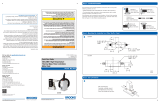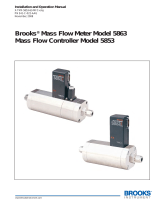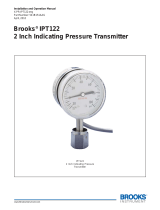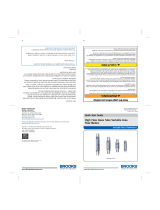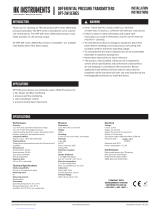Page is loading ...

Installation and Operation Manual
X-TMF-SLAMf-MFC-eng
Part Number: 541B032AAG
August, 2009 Brooks
®
Digital MFC's and MFM's
Model SLAMf50S
Analog I/O MFC
with RS-485
Model SLAMf53D
Digital I/O
DeviceNet
TM
MFC
Brooks
®
Models SLAMf50, SLAMf51, SLAMf53
Mass Flow Controllers and Models SLAMf60,
SLAMf61, SLAMf63 Mass Flow Meters
Brooks
®
Industrial Digital Series MFC's and MFM's
Model SLAMf50F
Digital I/O
FOUNDATION
®
Fieldbus MFC

Installation and Operation Manual
X-TMF-SLAMf-MFC-eng
Part Number: 541B032AAG
August, 2009Brooks
®
Digital MFC's and MFM's
ESD (Electrostatic Discharge)
Essential Instructions
Read this page before proceeding!
Brooks Instrument designs, manufactures and tests its products to meet many national and international standards. Because
these instruments are sophisticated technical products, you must properly install, use and maintain them to ensure they
continue to operate within their normal specifications. The following instructions must be adhered to and integrated into your
safety program when installing, using and maintaining Brooks Products.
• Read all instructions prior to installing, operating and servicing the product. If this instruction manual is not the correct
manual, please see back cover for local sales office contact information. Save this instruction manual for future reference.
• If you do not understand any of the instructions, contact your Brooks Instrument representative for clarification.
• Follow all warnings, cautions and instructions marked on and supplied with the product.
• Inform and educate your personnel in the proper installation, operation and maintenance of the product.
• Install your equipment as specified in the installation instructions of the appropriate instruction manual and per applicable
local and national codes. Connect all products to the proper electrical and pressure sources.
• To ensure proper performance, use qualified personnel to install, operate, update, program and maintain the product.
• When replacement parts are required, ensure that qualified people use replacement parts specified by Brooks Instrument.
Unauthorized parts and procedures can affect the product's performance and place the safe operation of your process at
risk. Look-alike substitutions may result in fire, electrical hazards or improper operation.
• Ensure that all equipment doors are closed and protective covers are in place, except when maintenance is being
performed by qualified persons, to prevent electrical shock and personal injury.
Pressure Equipment Directive (PED)
All pressure equipment with an internal pressure greater than 0.5 bar (g) and a size larger than 25mm or 1" (inch) falls under the
Pressure Equipment Directive (PED). The Directive is applicable within the European Economic Area (EU plus Norway, Iceland
and Liechtenstein). Pressure equipment can be traded freely within this area once the PED has been complied with.
• Section 1 of this manual contains important safety and operating instructions related to the PED directive.
• Meters described in this manual are in compliance with EN directive 97/23/EC module H Conformity Assessment.
• All Brooks Instrument Flowmeters fall under fluid group 1.
• Meters larger than 25mm or 1" (inch) are in compliance with category I, II, III of PED.
• Meters of 25mm or 1" (inch) or smaller are Sound Engineering Practice (SEP).
Handling Procedure:
1. Power to unit must be removed.
2. Personnel must be grounded, via a wrist strap or other safe, suitable means before any printed circuit card or other internal device is
installed, removed or adjusted.
3. Printed circuit cards must be transported in a conductive container. Boards must not be removed from protective enclosure until
immediately before installation. Removed boards must immediately be placed in protective container for transport, storage or return to
factory.
Comments
This instrument is not unique in its content of ESD (electrostatic discharge) sensitive components. Most modern electronic designs contain
components that utilize metal oxide technology (NMOS, SMOS, etc.). Experience has proven that even small amounts of static electricity
can damage or destroy these devices. Damaged components, even though they appear to function properly, exhibit early failure.

Installation and Operation Manual
X-TMF-SLAMf-MFC-eng
Part Number: 541B032AAG
August, 2009 Brooks
®
Digital MFC's and MFM's
Dear Customer,
We appreciate this opportunity to service your flow measurement and control requirements with a Brooks
Instrument device. Every day, flow customers all over the world turn to Brooks Instrument for solutions to their
gas and liquid low-flow applications. Brooks provides an array of flow measurement and control products for
various industries from biopharmaceuticals, oil and gas, fuel cell research and chemicals, to medical devices,
analytical instrumentation, semiconductor manufacturing, and more.
The Brooks product you have just received is of the highest quality available, offering superior performance,
reliability and value to the user. It is designed with the ever changing process conditions, accuracy requirements
and hostile process environments in mind to provide you with a lifetime of dependable service.
We recommend that you read this manual in its entirety. Should you require any additional information concerning
Brooks products and services, please contact your local Brooks Sales and Service Office listed on the back cover
of this manual or visit www.BrooksInstrument.com
Yours sincerely,
Brooks Instrument

Installation and Operation Manual
X-TMF-SLAMf-MFC-eng
Part Number: 541B032AAG
August, 2009Brooks
®
Digital MFC's and MFM's
THIS PAGE WAS
INTENTIONALLY
LEFT BLANK

i
Brooks
®
Digital MFC's & MFM's
Contents
Installation and Operation Manual
X-TMF-SLAMf-MFC-eng
Part Number: 541B032AAG
August, 2009
Page
Number
Section 1 Introduction
1-1 Scope .........................................................................................................................................1-1
1-2 Purpose......................................................................................................................................1-1
1-3 Description .................................................................................................................................1-1
1-4 Specifications .............................................................................................................................1-2
Section 2 Installation
2-1 General ......................................................................................................................................2-1
2-2 Receipt of Equipment.................................................................................................................2-1
2-3 Recommended Storage Practice ...............................................................................................2-1
2-4 Return Shipment ........................................................................................................................2-2
2-5 Transit Precautions ....................................................................................................................2-2
2-6 Removal from Storage ...............................................................................................................2-2
2-7 Gas Connections........................................................................................................................2-2
2-8 In-Line Filter ...............................................................................................................................2-3
2-9 Installation ..................................................................................................................................2-3
2-10 Electrical Interface......................................................................................................................2-5
2-11 Operation Check Procedure (Analog I/O) ..................................................................................2-8
2-12 Digital I/O: DeviceNet or F
OUNDATION Fieldbus..........................................................................2-9
2-13 DeviceNet I/O Assemblies..........................................................................................................2-9
Section 3 Operation
3-1 Overview ....................................................................................................................................3-1
3-2 Theory of Operation for Flow Measurement ..............................................................................3-1
3-3 Features .....................................................................................................................................3-2
3-4 Analog I/O Mode of Operation....................................................................................................3-3
3-5 Communications Features .........................................................................................................3-6
3-5-1 RS-485 Communications Features (Analog versions only)........................................................3-6
3-5-2 DeviceNet Communications Features........................................................................................3-6
3-5-3 FOUNDATION Fieldbus Communications Features ......................................................................3-7
3-6 Alarms and Warnings (Analog versions only) ............................................................................3-7
3-6-1 Alarms and Warnings (Analog versions only) ............................................................................3-8
3-6-2 Diagnostic Alarms (Analog versions only) ..................................................................................3-9
3-6-3 General Alarms and Warnings (Analog versions only)..............................................................3-10
3-7 Calibration/Configuration Sets...................................................................................................3-12
3-8 Special Features .......................................................................................................................3-12
3-8-1 Setpoint Ramping......................................................................................................................3-12
3-8-2 Low Setpoint Command Cutoff .................................................................................................3-13
3-8-3 Low Flow Output Cutoff.............................................................................................................3-13
3-8-4 Flow Output Damping ...............................................................................................................3-13
3-8-5 Adaptive Control........................................................................................................................3-13
3-8-6 Flow Totalizer ............................................................................................................................3-13
3-8-7 Flow Output Conditioning ..........................................................................................................3-13
3-8-8 Flow Signal Lock-in ...................................................................................................................3-13
3-9 PC-based Support Tools ...........................................................................................................3-13

ii
Brooks
®
Digital MFC's & MFM's
Contents Installation and Operation Manual
X-TMF-SLAMf-MFC-eng
Part Number: 541B032AAG
August, 2009
Section 4 Maintenance & Troubleshooting
4-1 Maintenance and Troubleshooting .............................................................................................4-1
4-1-1 System Checks ..........................................................................................................................4-2
4-1-2 Cleaning Procedures..................................................................................................................4-5
4-1-3 Calibration Procedure ................................................................................................................4-5
Section A CE Certificate
CE Certificate of Mass Flow Equipment................................................................................................A-1
Warranty, Local Sales/Service Contact Information....................................................................... Back Cover
Figures
Figure Page
Number Number
1-1 Open Collector Alarm Output. ....................................................................................................1-6
1-2 General Wiring ...........................................................................................................................1-6
1-3 Response Performance of Brooks Digital MFC .........................................................................1-7
1-4 Linear Ramp-up or Ramp-down from 200% per Second to 0.5% per Second Setpoint Change .....1-8
1-5 Analog, DeviceNet and FOUNDATION Fieldbus Terminal Layouts.................................................1-12
1-6 Model SLAMf50D Digital I/O DeviceNet MFC ............................................................................1-13
1-7 Model SLAMf50F Digital I/O FOUNDATION Fieldbus MFC .............................................................1-13
1-8 Model SLAMf51 with Cable Gland (PG11, M20 x 1.5, 1/2" NPT)...............................................1-14
1-9 Model SLAMf53 with Cable Gland (PG11, M20 x 1.5, 1/2" NPT)...............................................1-14
1-10 Model SLAMf60 with Cable Gland (PG11, M20 x 1.5, 1/2" NPT)...............................................1-15
1-11 Model SLAMf61 with Cable Gland (PG11, M20 x 1.5, 1/2" NPT)...............................................1-15
1-12 Model SLAMf63 with Cable Gland (PG11, M20 x 1.5, 1/2" NPT)...............................................1-16
1-13 Model SLAMf63 with Cable Gland (PG11, M20 x 1.5, 1/2" NPT) with Flanged Connections........1-16
2-1 Analog I/O Pin Connctions, Top View Uncovered .......................................................................2-6
2-2 Common Electrical Hookups, Voltage I/O Version ......................................................................2-6
2-3 Recommended Wiring Configuration for Current Signals (Non-Isolated Power Supply) ............2-7
2-4 Recommended Wiring Configuration for Current Signals (Isolated Power Supply) ....................2-7
3-1 Flow Sensor Operational Diagram (VCR
TM
End Connections Shown) ........................................3-4
3-2 Externally Accessable Adjustment for all Meters/Controllers ......................................................3-4
4-1 Bench Troubleshooting Circuit ....................................................................................................4-3
Tables
Table Page
Number Number
1-1 Flow Ranges and Pressure Ratings...........................................................................................1-3
1-2 Calibration Select Signal ............................................................................................................1-8
1-3 Analog I/O Pin Connections .......................................................................................................1-8
2-1 Recommended Filter Size..........................................................................................................2-3
3-1 Typical Resistor Values for Calibration Selection .......................................................................3-5
4-1 Sensor Troubleshooting .............................................................................................................4-5
4-2 Troubleshooting..........................................................................................................................4-6

1-1
Section 1 - Introduction
Installation and Operation Manual
X-TMF-SLAMf-MFC-eng
Part Number: 541B032AAG
August, 2009 Brooks
®
Digital MFC's and MFM's
1-1 Scope
Thank you for purchasing a Brooks Instrument Digital Mass Fow Product.
This manual, X-TMF-SLAMf-MFC-eng is an installation and operation
manual for your instrument.
If you have purchased a Brooks
®
Digital Series with DeviceNet
Communications, a separate DeviceNet Instruction Manual shall also be
provided as part of the operating documentation.
1-2 Purpose
The Brooks Digital Series are mass flow measurement devices designed
for accurately measuring (MFM's) and rapidly controlling (MFC's) flows of
gases. This instruction manual is intended to provide the user with all the
information necessary to install, operate and maintain the Brooks
®
MFC
and MFM. This manual is organized into the following sections:
Section 1 Introduction
Section 2 Installation
Section 3 Operation
Section 4 Maintenance & Troubleshooting
Section A CE Certifications
Back Cover Warranty, Local Sales/Service Contact Information
It is recommended that this manual be read in its entirety before attempting
to operate or repair these Smart II Digital products.
1-3 Description
Brooks Instrument’s SLAMf Series is an elastomer sealed digital thermal
mass flow measurement and control instrument, which offers unparalleled
flexibility and performance. The SLAMf Series MFC is designed for use in
advanced gas handling systems. The result is the most accurate,
repeatable, and responsive MFC on the market today!
Wash-down Enclosure
The SLAMf Series comes equipped with an IP66 / NEMA4X rated
enclosure. This makes these instruments perfect for wash-down or outdoor
environments. So no matter how harsh the surroundings, the SLAMf Series
keeps the process under control.
Wide Flow Range
The SLAMf Series covers an extremely broad range of flowrates. Model
SLAMf50 can have a full scale flow as low as 3 ccm. With a high turndown
ratio of 50:1, accurate gas flow can be measured or controlled down to
0.06 ccm! Model SLAMf53 can meter or control gas flow up to 2500 lpm.
Fast response Performance
The all-digital electronics and superior mechanical configuration in the
SLAMf Series provide for ultra fast response characteristics. Settling times
are specified as less than one second, but Brooks’ Adaptive Valve Control
can achieve response times of 0.2 sec.

1-2
Section 1 - Introduction
Installation and Operation Manual
X-TMF-SLAMf-MFC-eng
Part Number: 541B032AAG
August, 2009Brooks
®
Digital MFC's and MFM's
Broad Array of Communication Options
Brooks
®
offers traditional 0-5 volt and 4-20mA analog options as well as
RS-485 digital communications (“S-protocol”, based on HART). Brooks also
offers control interface via digital network protocols like DeviceNet, a high-
speed (up to 500k baud) digital communication network, or FOUNDATION
®
Fieldbus. Brooks’ communication capabilities and device-profiles have been
certified by the ODVA (Open DeviceNet Vendor’s Association) and the ITK
(Interoperability Test Kit.) Other network protocols are in development. Talk to
your Brooks representative about your specific needs.
Reduced Cost of Ownership
The SLAMf Series allows multi-gas and multi-range capabilities to reduce
customer inventory. Storage and pre-programming of up to 10 gas
calibrations easily permits users to switch between different gases and
ranges on a single device.
1-4 Specifications
PERFORMANCE CHARACTERISTICS:
Flow Ranges
Models SLAMf50/SLAMf60
Any FS range from 0-3 ccm to 0-30 lpm N
2
eq.
Models SLAMf51/SLAMf61
Any FS range from 20 -100 lpm N
2
eq.
Up to 200 lpm H
2
flow possible
Models SLAMf53/SLAMf63
Any FS range from 100 -2500 lpm N
2
eq.
Control Range
Turndown 50:1
Accuracy
±1.0% of rate (20% - 100% FS)
±0.2% FS (below 20% FS) up to 1100 lpm (N
2
eq.).
Flow ranges above 1100 lpm and up to 2500 lpm (N
2
eq.): ±1.0% of full scale
(Optional: ±0.7% of rate ±0.2% FS ("S-Series") up to 1100 lpm (N
2
eq.).
Repeatability
±0.20% of rate
Settling Time/Response Time
< 1 second to within ±2% FS of final value for a
0-100% command step (better on request)
for flow rates up to 100 lpm N
2
eq.
< 3 seconds to within ±2% FS of final value for a
0-100% command step (better on request)
for flow rates greater than 100 lpm N
2
eq. up to 2500 lpm N
2
eq.

1-3
Section 1 - Introduction
Installation and Operation Manual
X-TMF-SLAMf-MFC-eng
Part Number: 541B032AAG
August, 2009 Brooks
®
Digital MFC's and MFM's
Sensitivity to Mounting Attitude:
<0.2% FS maximum deviation from specified accuracy, after rezeroing.
RATINGS:
Temperature Sensitivity
Zero: less than 0.05% FS per °C
Span: less than 0.05% FS per °C
Pressure Sensitivity
± 0.03% per psig up to 200 psig (13.79 bar) (N
2
Eq.).
Maximum Operating Pressure
See Table 1-1
Pressure Equipment Directive (PED) 97/23/EC
See Table 1-1.
Pressure Differential Range (Controllers)
Minimum
Model SLAMf50
5 psi (0.35 bar) up to 30 lpm N
2
eq.
Model SLAMf51
10 psi (0.69 bar) from 30 lpm to 100 lpm N
2
eq.
Model SLAMf53
7.5 psi (0.52 bar) at 500 lpm N
2
eq.
14.5 psi (1.00 bar) at 1000 lpm N
2
eq.
35.0 psi (2.41 bar) at 2500 lpm N
2
eq.
(consult factory for details)
High DP valve 30 to 290 psi (20 bar maximum)
Low DP valve 7.5 to 30 psid (2 bar max.)
Minimum pressure drop depends on gas and FS flow rate (consult factory)
Leak Integrity
Inboard to Outboard: 1x10
-9
atm scc/sec Helium max.
Ambient Temperature Limits
Operating: 0°C to 65°C (32°F to 149°F)
Non-Operating: -25°C to 100°C (-13°F to 212°F)
Fluid Temperature Limits
0°C to 65°C (32°F to 149°F)
Table 1-1 Flow Ranges and Pressure Settings
Mass Flow
Controlle
r
Mass Flow
Mete
r
Pressure Ratings
P.E.D. Module H Category
Model: Model: Min. FS Max. FS
Unit
(2)
Bar/psi
SLAMF50 (1)
SLAMF60
(1)
0.003 30 lpm 100bar/1500psi SEP
SLAMF51 SLAMF61 20 100 lpm 100bar/1500psi(3) SEP
SLAMF53 SLAMF63 100 2500 lpm 70bar/1000psi 1 for all 150lbs flanges
2 for all other connections
Flow Ranges N2 Equivalent
(1) 300 bar (4500 psi) version optional
(2) Refering to normal or standard conditions (on customer request)
(3) 70 bar / 1000 psi for UL Certification

1-4
Section 1 - Introduction
Installation and Operation Manual
X-TMF-SLAMf-MFC-eng
Part Number: 541B032AAG
August, 2009Brooks
®
Digital MFC's and MFM's
PHYSICAL:
Materials of Construction
Wetted parts - stainless steel with Viton
®
fluoroelastomers or Buna-N
Optional: Kalrez
®
, Teflon
®
/Kalrez and EPDM
Outline Dimensions
Refer to Figures 1-6 through 1-13.
Process Connections
Refer to Figures 1-6 through 1-13.
ELECTRICAL CHARACTERISTICS:
Electrical Connections
Analog I/O Pin Connections (See Figure 1-5)
Analog/RS-485 version: 15-pin D-Connector, male
Digital I/O:
DeviceNet : 5-pin Micro-Connector, male
FOUNDATION Fieldbus: 4-pin Micro-Connector, male
Power Supply Voltage
Analog option: (13.5-27 Vdc), 15 Vdc nominal
Digital I/O:
DeviceNet I/O: 11-25 Vdc
FOUNDATION Fieldbus I/O: 14-27 Vdc
Power Requirements
Watts, typ. Watts, max.
Analog I/O option, No valve: 1.6 1.8
Analog I/O option, With valve: 3.6 4.0
Digital I/O option No valve: 3.6 4.0
Digital I/O option With valve: 6.9 7.6
Reference Conditions
Due to effects of pressure and temperature on the compressibility of gases, specific reference conditions must be used when
reporting volumetric flow rates in mass flow terms. For example, the unit of measure SCCM (standard cubic centimeters per
minute) refers to a volumetric gas flow at a standard reference condition, NOT the actual volumetric gas flow at the actual
operating pressure and temperature. The key point is that the MASS FLOW of the gas is fixed, but the reference volumetric
flow can be reported differently based upon the standard reference condition used in the calculation.
Throughout the world, there are differences in terminology when describing reference conditions for gases. The words
“normal conditions” and “standard conditions” are sometimes used interchangeably to describe the reference STP (Standard
Temperature and Pressure) for gases. Further note that temperature and pressure values for standard or normal reference
conditions vary in countries and industries worldwide. For example, the Semiconductor Equipment Manufacturing Industry
(SEMI) defines standard temperature and pressure conditions as 273.15 K (0 °C) and 101,325 Pa (760 torr). The main
concern is that no matter what words are used for descriptive purposes, a gas mass flow rate must have a defined standard
pressure and temperature reference condition when performing a volumetric conversion.

1-5
Section 1 - Introduction
Installation and Operation Manual
X-TMF-SLAMf-MFC-eng
Part Number: 541B032AAG
August, 2009 Brooks
®
Digital MFC's and MFM's
Command/Setpoint Input (Analog I/O capabilities)
Voltage and Current type inputs (but not both simultaneously) are
supported.
Setpoint input types are software selectable as follows:
0 - 5 Vdc
1 - 5 Vdc
0 - 20 mA
4 - 20 mA
Voltage Setpoint Input Specifications
Nominal Range: 0 - 5 Vdc
Full Range: 0 - 5.5 Vdc
Absolute Max.: 20 V
(Without Damage)
Input Impedence: >990 kΩ
Current Setpoint Input Specifications
Nominal Range: 4 - 20 mA or 0 - 20 mA
Full Range: 0 - 22 mA
Absolute Max.: 25 mA
(Without Damage)
Input Impedence: 125 Ω
Flow Output (Analog I/O version only)
Voltage and current type outputs (but not both simultaneously) are
supported. Flow output types are selectable as follows.
0 - 5 Vdc
1 - 5 Vdc
0 - 20 mA
4 - 20 mA
Flow Output (Voltage) Specifications
Nominal Range: 0 - 5 Vdc, 1 - 5 Vdc
Full Range: -0.5 - 5.5 Vdc (@ 0-5 Vdc); 0.6 - 5.5 Vdc (@ 1-5 Vdc)
Min. Load Resistance:2 kΩ
Flow Output (Current) Specifications
Nominal Range: 4 - 20 mA or 0 - 20 mA
Full Range: 0-22 mA (@ 0-20 mA); 3.8-22 mA (@ 4-20 mA)
Max. Load: 380 Ω (for supply voltage < 16 Vdc)
580 Ω (for supply voltage
> 16 Vdc)
Valve Override Signal (Analog I/O version only)
The Valve Override Signal (VOR) is implemented as an analog input which
measures the voltage at the input and controls the valve based upon the
measured reading as follows:
Floating / Unconnected: Instrument controls valve to command setpoint
VOR < 0.3 Vdc: Valve Closed
VOR > 4.8 Vdc: Valve Open
0.3 Vdc > VOR > 4.8 Vdc: Undefined

1-6
Section 1 - Introduction
Installation and Operation Manual
X-TMF-SLAMf-MFC-eng
Part Number: 541B032AAG
August, 2009Brooks
®
Digital MFC's and MFM's
Figure 1-1 Open Collector Alarm Output
Figure 1-2 General Wiring
Valve Override Signal Specifications (Analog I/O Versions only)
Input Impedence: 800 kΩ
Absolute Max. Input: -25 Vdc > VOR
> 25 Vdc
(without damage)
5 Volt Reference Signal (Analog I/O versions only)
A 5 Vdc reference output is provided to the customer for use in generating
a setpoint and/or Valve Override signal. The current drive of this output is
very limited and must be used with care.
Min. Load Resistance: 2 kΩ (2.5 mA maximum)
Accuracy: +1.0%

1-7
Section 1 - Introduction
Installation and Operation Manual
X-TMF-SLAMf-MFC-eng
Part Number: 541B032AAG
August, 2009 Brooks
®
Digital MFC's and MFM's
Alarm Output (Analog I/O versions only)
The Alarm Output is an open collector or "contact" type that is CLOSED
(on) whenever an alarm is active. The Alarm Output may be set to indicate
any one of various alarm conditions. Reference Section 3-6-2 for more
information on alarms.
Type: Open Collector
Max Closed (ON) Current: 25 mA
Max Open (OFF) Leakage: 1 μA
Max Open (OFF) Voltage: 30 Vdc
Fast Response Performance
The curves in Figure 1-3 depict the MFC output signal and actual
transitional flow to steady-state when gas flow enters into process
chamber, under a step response command condition.
Brooks devices also feature adaptive (optimized) PID control, including fast
response. and linear ramp-up and/or ramp-down control characteristics.
Calibration Selection Signal (Analog I/O versions only)
Select one of ten gases and select PID tuning settings in analog mode.
Requires external connection of resistors between Pin # 13 and Pin # 9.
(Reference Tables 1-2 and 1-3.)
Selectable Soft Start
Processes requiring injection of gases can be adversely affected by
excessive initial gas flow. This abrupt injection of gas can result in process
damage from explosion or initial pressure impact. These problems are
virtually eliminated with the soft start feature.
Traditional soft start or linear ramp-up and/or ramp-down (See Figure 1-4)
can be factory selected or set by the user via special software.
Linear ramp-up is adjustable at 200% per second down to 0.5% per
second setpoint change.
(to be specified when ordering the device).
Figure 1-3 Response Performance of Brooks Digital MFC

1-8
Section 1 - Introduction
Installation and Operation Manual
X-TMF-SLAMf-MFC-eng
Part Number: 541B032AAG
August, 2009Brooks
®
Digital MFC's and MFM's
Figure 1-4 Linear Ramp-up and/or Ramp-down from 200% Per Second Down to
0.5 % Per Second Setpoint Change
DEFAULT = CAL# 1 (External resistor not installed)
CAL Resistor Value (k ohms) CAL Resistor Value (k ohms)
1 Not Installed 6 124
2 Shorted 7 80.6
3 665 8 52.3
4 324 9 30.9
5 191 10 15
Table 1-3 Analog I/O Pin Connections:
Table 1-2 Calibration Select Signal
Function PIN
Setpoint, Command Input (-) 1
Flow Signal, 0(1) -5 volt, Output (+) 2
TTL Alarm, open collector, Output (+) 3
Flow Signal, 0(4)-20 mA, Output (+) 4
Power Supply, +13.5 Vdc to +27 Vdc(+) 5
Not Connected 6
Setpoint, 0(4)-20 mA, Input (+) 7
Setpoint, 0(1)-5 Vdc, Input (+) 8
Power Supply, Common (-) 9
Flow Signal, Common, Output, (-) 10
Reference, +5 Vdc, Output (+) 11
Valve Override, Input 12
Calibration Select Input 13
RS-485 Common B (-) 14
RS-485 Common A (+) 15

1-9
Section 1 - Introduction
Installation and Operation Manual
X-TMF-SLAMf-MFC-eng
Part Number: 541B032AAG
August, 2009 Brooks
®
Digital MFC's and MFM's
RS-485 Communications
The Brooks SLAMf Digital Series is equipped with RS-485 communication
capability. This form of multi-drop capable communication provides access
to many of the Brooks Smart II Digital Series functions for "control and
monitor" operations, including:
• Accurate setpoint adjustment flow output measurement
(including units of measure selection)
• Valve Override (controller only)
• Flow Totalizer
• Alarm status and settings
• Soft Start Control (controller only)
Refer to Table 1-3 (Analog I/O pin connections), that enables the device to
communicate via a personal computer for process control. The
communication speed (baud rate) is software selectable.
Baud rate selections for the Brooks SLAMf Digital Series related to RS-485
are: 300, 600, 1200, 2400, 4800, 9600, 19200, 38400, 57600 and 115200
baud and can be selected via software.
The RS-485 is essentially a multidrop connection. It allows a maximum of
32 devices to be connected to a computer system. IBM-compatible PC's
are not equipped with RS-485 ports as standard. An RS-232 to RS-485
converter or RS-485 interface board is therefore required to connect an
RS-485 network to a standard pc. The RS-485 bus, a daisy chain network,
meaning that the wires are connected at the units as in Figure 1-2.
DeviceNet Communications
The Brooks SLAMf Digital Series is also available with DeviceNet
TM
communication capability. DeviceNet is an open digital protocol capable of
high speeds and easy system connectivity. Brooks Instrument has several
of its devices available on this popular networking standard, and is a
member of ODVA
TM
(Open DeviceNet Vendors Association), the governing
standard body for DeviceNet.
DeviceNet
is similar to the RS485 standard in that it is a multi-drop
connection that allows a maximum of 64 devices to be connected on the
same network. Baud rate selections for DeviceNet
products are 125K,
250K and 500K and can be selected via MAC ID switches mounted on the
device.
The DeviceNet
communication link also provides access to many of the
Brooks SLAMf Digital Series functions for “control and monitor” operations,
including:
• Accurate setpoint adjustment and flow output measurement (including
units of measure selection)
• PID Settings (controller only)
• Valve Override (controller only)
• Calibration Gas Select
• Soft Start Control (controller only)

1-10
Section 1 - Introduction
Installation and Operation Manual
X-TMF-SLAMf-MFC-eng
Part Number: 541B032AAG
August, 2009Brooks
®
Digital MFC's and MFM's
FOUNDATION
®
Fieldbus Communications:
The Brooks SLAMf Digital Series is supporting F
OUNDATION
®
Fieldbus
communication protocol. FOUNDATION
®
Fieldbus is a digital network allowing
usage of existing 4-20mA cables, avoiding costly re-wiring. Fully certified
by passing ITK, this device has passed several Interoperability
requirements over a broad range of hosts. When combined with DeltaV
and using the power of PlantWeb, those devices provide intelligent alerts
allowing accurate device maintenance and service.
• Value Range check - Part of the standard function blocks
• Temperature sensor connection - Check sensor connection
• Firmware checksum - Check for Internal firmware integrity
• Non-volatile memory - Check for non-volatile memory integrity
• RAM - Check for RAM integrity
• Zero Drift/Valve Leak-by - Check for flow leak-by or sensor zero drift
• Device Overhaul due - Preventive Maintenance
• Calibration Due - Preventive Maintenance
• Valve spring life - Preventive Maintenance
• No Flow - No flow detected when setpoint requested
• Reverse Flow - Reverse flow detected
• Flow Totalizer - Informed when a user define amount of fluid has been
delivered
• Time Totalizer - Informed when a user define amount of time has
expired
Device type dependant function block are available representing the
different device functions:
• Current Flow Value (Mass Flow device only)
• Current Pressure Value (Pressure device only)
• Current Device Temperature (Mass Flow device only)
• Current Valve position (Controller Only)
• Setpoint Control (Controller Only)
• Direct Valve Control (Controller Only)
• Actuator Override (Controller Only)
• Ultra-fast (8ms) PID function block for Cascade control
(all devices)

1-11
Section 1 - Introduction
Installation and Operation Manual
X-TMF-SLAMf-MFC-eng
Part Number: 541B032AAG
August, 2009 Brooks
®
Digital MFC's and MFM's
Certifications:
EMC Directive 89/336/EEC:
Per EN 61326
Enclosure: Type 4X / IP66
Ambient Temperature: 0
0
F > Tamb < 150
0
F, (0
0
C > Tamb < 65
0
C)
Hazardous Location Classification
United States and Canada - Non incendive
UL Listed: E73889 Volume 1, Section 25
UL Recognized: E73889 Volume 3, Section 4
Class I, Division 2, Groups A, B, C, D, F and G; T4
Class I, Zone 2, AEx nA II T4
Per ANSI/ISA 12.12.02 - 2003 and ANSI/UL 60079 - 15
Ex nA II T4
Per CSA - E79 - 15
Europe - ATEX Directive 94/9/EC - Non Sparking
KEMA 04ATEX1290X
II 3 G Ex nA II T4
II 3 D Ex tD A22 IP66 T 85
0
C
Per EN 60079-0: 2006; EN 60079-15: 2005:
EN 61241-0: 2006; EN 61241-1: 2004
IECEx-Non Sparking
KEM 08.0043X
Ex nA II T4
Ex tD IP66 T 85
0
C
Per IEC 60079-0: 20044; IEC 60079-15: 2005;
IEC 61241-0: 2004; IEC 61241-1: 2004
Instructions for Safe Use:
United States and Canada: A Class 2 Power Supply must be used.
ATEX and IECEx:
1. Provisions shall be made to prevent the rated voltage from being
exceeded by transient disturbances of more than 40%.
2. When the temperature under rated conditions exceeds 70
0
C at the
cable or conduit entry point, or 80
0
C at the branching point of the
conductors, the temperature specification of the selected cable shall be in
compliance with the actual measured temperature values.
Pressure Equipment Directive (97/23/EC)
See pressure Table 1-1 for further information.

1-12
Section 1 - Introduction
Installation and Operation Manual
X-TMF-SLAMf-MFC-eng
Part Number: 541B032AAG
August, 2009Brooks
®
Digital MFC's and MFM's
Figure 1-5 Analog, DeviceNet and FOUNDATION Fieldbus Terminal Layouts
Analog I/O Pin Function PIN
Setpoint, Command Input (-) 1
Flow Signal, 0(1) -5 volt, Output (+) 2
TTL Alarm, open collector, Output (+) 3
Flow Signal, 0(4)-20 mA, Output (+) 4
Power Supply, +13.5 Vdc to +27 Vdc(+) 5
Not Connected 6
Setpoint, 0(4)-20 mA, Input (+) 7
Setpoint, 0(1)-5 Vdc, Input (+) 8
Power Supply, Common (-) 9
Flow Signal, Common, Output, (-) 10
Reference, +5 Vdc, Output (+) 11
Valve Override, Input 12
Calibration Select Input 13
RS-485 Common B (-) 14
RS-485 Common A (+) 15
DeviceNet Terminal Layout
PC-based Support Tools
Brooks Instrument offers a variety of PC-based process control and service tools to meet the needs of our
customers. Smart DDE may be used with any unit supporting RS-485 in a multidrop configuration, thus allowing
users to control and monitor their Brooks devices. The Brooks Service Tool
TM
(BST) may be used to monitor,
diagnose, tune and calibrate Brooks devices equipped with DeviceNet or FOUNDATION Fieldbus communications.
The Brooks Service Tool
TM
interfaces with Brooks products via a special service port.
FOUNDATION Fieldbus Terminal Layout
Analog Terminal Layout

1-13
Section 1 - Introduction
Installation and Operation Manual
X-TMF-SLAMf-MFC-eng
Part Number: 541B032AAG
August, 2009 Brooks
®
Digital MFC's and MFM's
Figure 1-7 Model SLAMf50F Digital I/O FOUNDATION Fieldbus MFC
Figure 1-6 Model SLAMf50D Digital I/O DeviceNet MFC

1-14
Section 1 - Introduction
Installation and Operation Manual
X-TMF-SLAMf-MFC-eng
Part Number: 541B032AAG
August, 2009Brooks
®
Digital MFC's and MFM's
Figure 1-8 Model SLAMf51 with Cable Gland (PG11, M20 x 1.5, 1/2" NPT)
Figure 1-9 Model SLAMf53 with Cable Gland (PG11, M20 x 1.5, 1/2" NPT)
/


